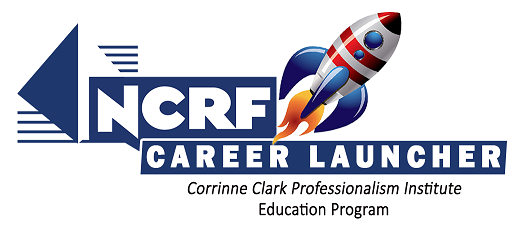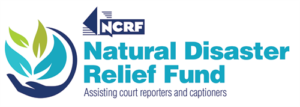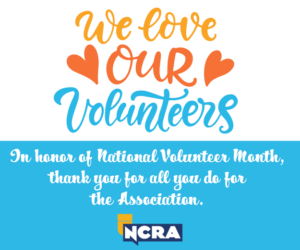After a 10-day social media countdown with four videos that attracted over 4,500 views, NCRF’s new Career Launcher Program successfully lifted off with a webinar held on July 10 that drew over 100 participants eager to learn more about this innovative, self-paced, educational offering that consists of mock deposition modules with transcription assignments. The program was developed with the support of the NCRF Corrinne Clark Professionalism Institute.
The Career Launcher program is designed to serve as a bridge for students and new professionals between graduation and their first job, exposing new reporters to real-life situations, equipping them with the knowledge needed to handle them. Candidates who participate in the program will receive feedback from volunteer veteran court reporters who will review each assignment submitted to help participants further their learning.
The July 10 webinar was hosted by the Career Launcher team and provided attendees with an overview of the program starting with a glimpse of what it’s about, how it works, what participants can expect, and what role the volunteer reviewers play, as well as a tutorial on how to sign up and get started. The Career Launcher team members include: NCRA President Debbie Dibble, RDR, CRR, CRC, from Salt Lake City, Utah; and NCRA members Kevin Hunt, from Buffalo, N.Y.; Merilee Johnson, RDR, CRR, CRC, from Eden Prairie, Minn.; and Mike Miller, FAPR, RDR, CRR, from Houston, Texas. If you missed the webinar, you can watch it here: Career Launcher Webinar rerun.
“Every module is saturated with industry knowledge from seasoned professionals,” said Johnson about the program. “School teaches you a skill, a craft, but sometimes hands-on training comes after. A medical student, for example, graduates and then spends five years in a residency learning practical experience under the tutelage of experienced doctors. Career Launcher is 150 years of the team members’ training packed into a 10-module residency.”
Johnson advises candidates to register for the program only when they are ready to dedicate themselves to learning because, just like in a real career, the program requires candidates to set deadlines and be responsible for allocating their time to meet them to produce professional transcripts.
“This program is designed to be a mini day in the life of a reporter, from arriving at the depo location through producing a final product,” added Hunt. “Each module increases in complexity to create a layered experience in gradual knowledge accumulation as you progress through the program.”
A main component of the Career Launcher Program is the Resource Manual, which Dibble said will be a candidate’s lifeline for years to come. It should be downloaded, saved, and put on their shelf for future reference as they are introduced to new scenarios and experiences during the initial phases of their career.
“We used NCRA Guidelines as a foundational starting point,” she said. “We can’t teach candidates all the nuances of different formats, different jurisdictions, different counties, but we can expose them to the elements of the industry and highlight the research they will need to do to create a quality transcript.”
A second major component of the program are the volunteer reviewers who hold vital knowledge from their own career experience that they can then impart to a new professional entering the field.
“Reviewers are the key to the success of this program, the heart of the Career Launcher family,” said Miller. “Grading is not about counting words or ‘a’ versus ‘the.’ This program is to train new reporters on how to create a quality transcript. If you are interested in giving of your time, please join us in giving back to our new professionals of tomorrow.
“What we are asking you to consider as a reviewer is, if it’s not wrong, it’s right. There are as many ways to format a transcript as there are reporters in the world. Personal preferences do not translate to everyone and do not constitute a failing grade,” he added.
According to Miller, reviewers also have the option of developing closer mentorship-like connections with the candidates they are assigned to review. “The real value of this program will be a better trained workforce in the years to come. This is not a moneymaker. It is an opportunity to have new professionals entering the field prepared to do the job, and that rising tide of quality will raise all boats,” he said.
Prior to launching the program, the Career Launcher team reached out to a number of students and seasoned veterans to serve as beta testers. The comments back were overwhelmingly positive and validated that there is a long-felt need for this type of training aid, said Dibble.
“The modules were simple and easy to follow. The accuracy and professionalism of the production of the videos were perfect. It felt like I was in a real deposition,” said Riley Werner, a student at the College of Court Reporting in Valparaiso, Ind., who served as a beta tester for the program. Werner, who is currently writing at 225 words per minute, plans to be a freelance court reporter upon graduation.
“What was most helpful about the modules was that it shows you exactly what you should do in a deposition, all the way from the time you arrive until the time you are finished and go off the record. For example, arriving at the deposition, finding the perfect spot in the room, swearing in the witness, things like that which are very important,” she added.
The cost for the 10-module program is currently $100 for members and $175 for nonmembers. Once someone registers, they have ten months to complete the 10 modules from the date of purchase. Upon completion of the entire program, participants will receive a certificate verifying that they have completed the Career Launcher program. No CEUs are currently awarded.
Starting in August, the program will also be offered at the cost of $279 for members and $350 for nonmembers with a total of 0.40 CEU offered upon completion of the program. To learn more about the program or to register, visit the NCRA Learning Center.
Anyone interested in volunteering to serve as a Career Launcher Reviewer can learn more or register at NCRF Career Launcher Reviewer Enrollment, or by emailing Brenda Gill, NCRA Membership and Development Manager, at bgill@ncra.org. Career Launcher Reviewers are eligible to receive 0.50 PDC (Professional Development Credits)* after reviewing transcripts from 10 modules.
“I hope all students and new professionals take advantage of this amazing program! It is so helpful and educational when learning how to become a professional reporter. You will have a better idea of what to expect out in the real world,” Werner said.
“A great benefit of enrolling in this program is that you will be prepared to take depositions, you will understand how to create a transcript, and you will learn how to be a professional. I plan to enroll, and I am excited to continue learning how to better myself to succeed in this amazing career,” she added.
*PDCs are Professional Development Credits, a subset of Continuing Education Units, which can be applied to the overall CEUs requirement for maintaining certification. PDCs may be granted for qualifying activities that do not include class time, such as qualifying on a Speed or Realtime Contest leg. Most individuals are limited to 1.0 PDC per cycle toward their continuing education requirements.














